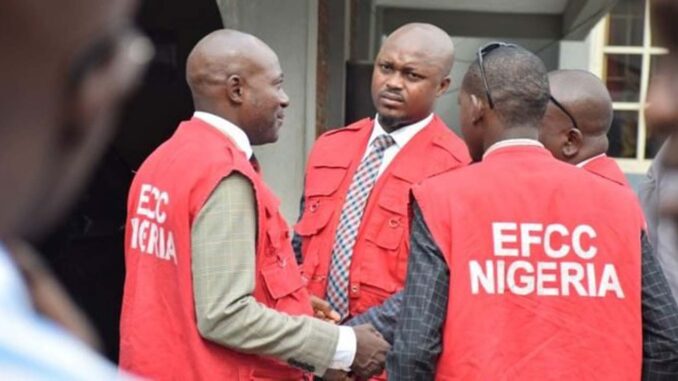
It has become the same, old and stale story of humongous amounts of criminally acquired funds and countless number of properties forfeited to the government by highly placed Nigerians who abuse the public offices they occupied but who, inexplicably are allowed to remain anonymous. The media was recently awash with stories and pictures of the seizure by the Economic and Financial Crimes Commission (EFCC) of assets estimated at over N10.9 billion and the forfeiture of same to the Federal Government through an order of a Federal High Court in Abuja. In what has become routine practice for our anti-corruption agencies, unfortunately, the press statement issued by the EFCC on the matter simply stated that the seized assets belonged to “a top military officer but controlled through proxies”. Naming and shaming top public functionaries who engage in looting the treasury has been identified as one of the ways of discouraging and combatting the culture of corruption that has constituted a formidable obstacle to the country’s developmental aspirations.
The EFCC’s silence on the identity of the ‘top military officer’ in this instance is thus a disservice to the anti-corruption war. To its credit, the detailed inventory of looted assets forfeited to government by the unnamed officer shows that the anti-graft agency did a thorough job in investigating and unveiling the criminal activities of the culprit. According to the EFCC, “The 24 properties scattered across Kano, Kaduna, Borno and Cross River states comprise land, shopping complex, gas and fuel stations cumulatively valued at N10, 935, 000, 000.00”. The commission then goes on to list in meticulous details the said properties and their locations. Given the obvious industry that went into investigation of this crime, the EFCC should have gone ahead to disclose the identity of the indicted officer.
Perhaps the commission declined to identify the said officer because nobody showed up to claim ownership of the said properties when interested members of the public were invited to do so through media adverts as directed by the court. As the agency put it, “The court had ordered the publication of notices in national newspapers, inviting persons with interest in the properties to show cause why they should not be finally forfeited to the Federal Government of Nigeria. With no such interest shown by any entity, Justice Maha on February 14, 2022, ordered the final forfeiture of the properties to the Federal Government”. But then, despite no one coming forward to claim the assets in question, the anti-graft agency was still confident enough to attribute their ownership to a top military officer acting through proxies. Its refusal to name names may create the impression in some quarters that the agency may not be sure of its facts.
True, the officer involved has been deprived of the ownership of these assets and the illicit income he derived from them. But that surely is not enough. It is also important that his identity be revealed so that he and his family become objects of derision and obloquy in the society. Furthermore, the EFCC’s statement on the issue simply described the individual involved as “a top military officer”. We are not told if he is still serving or retired. In either case, is the forfeiture of the criminally acquired assets sufficient punishment? We don’t think so. This is particularly because the inefficacy of the military to rise decisively to check the menace of banditry, terrorism and insurgency in different parts of the country over the last decade has been largely attributed to inadequate motivation and equipment as some top military officers engage in large scale looting of funds appropriated to do so.
It is not enough to titillate the public with salacious stories of illegal funds and properties seized from unnamed top military officers. The criminal actions of such officers have fatal implications not just for the lives of officers and men under their command but also for those of thousands of civilians in areas plagued by terrorism and banditry, who are casualties of the resultant ineffectiveness of the military in meeting its professional responsibility of protecting the territorial integrity of the polity. Of course, we are not saying that naming individuals involved in corrupt acts is enough to check this menace. But it is a necessary step to take in any meaningful attempt to make corrupt practices less attractive in our society.
At the onset of the President Muhammadu Buhari administration in 2015, large scale corruption involving top members of the military and political hierarchy in the previous government was uncovered to the tune of over N2.5 billion. It is unfortunate that most of these cases being prosecuted in different courts have been caught up in the labyrinthine maze of the country’s complex judicial process since then. But this should not prevent the appropriate authorities from continuing to name those involved in these corrupt acts once they are uncovered. This latest incident indicates that continued diversion of funds meant to equip the military and promote the welfare of its officers and men is still largely in practice.
END

Be the first to comment